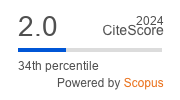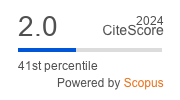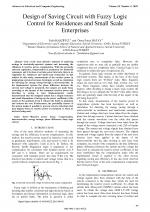| 4/2010 - 16 |
Design of Saving Circuit with Fuzzy Logic Control for Residences and Small Scale EnterprisesBASCIFTCI, F. |
| Extra paper information in |
| Click to see author's profile in |
| Download PDF |
Author keywords
reactive power factor, compensation, microcontroller, energy savings, phase difference, fuzzy logic control
References keywords
power(11), link(5), factor(5)
No common words between the references section and the paper title.
About this article
Date of Publication: 2010-11-30
Volume 10, Issue 4, Year 2010, On page(s): 99 - 102
ISSN: 1582-7445, e-ISSN: 1844-7600
Digital Object Identifier: 10.4316/AECE.2010.04016
Web of Science Accession Number: 000284782700016
SCOPUS ID: 78649710774
Abstract
One of the most effective methods of achieving savings in electrically-operated systems and increasing the efficiency is reactive power compensation. With the presently enforced regulation, compensation is mandatory for industrial consumers and it is done at certain power intervals, there is no regulation for residences and small scale enterprises on this subject. In this study, measurement of the reactive power in single-phase systems has been developed, as well as calculation for directing for energy saving through a microcontroller. In the implemented system, the phase difference between the current and voltage is measured, the outputs are made fuzzy according to the amount of the consumed reactive power and directing to saving is done Implementation results demonstrated that the designed system has a simple structure and small dimensions, it brings up the power coefficient of the system to the optimum level, it reduces the faults to minimum and reduces the cost. Furthermore, the portability feature of the system makes it possible to prevent adverse situations that may happen when no reactive power is consumed or when no device is being used. |
| References | | | Cited By «-- Click to see who has cited this paper |
| [1] O. Demirkol, "Measurement and Compensation in with Harmonic and Unbalanced Network", Master thesis, Graduate School of Natural and Applied Sciences, Sakarya, Turkey, 2006.
[2] B. R. Lin, S.C. Tsay, M.S. Liao, "Integrated power factor compensator based on sliding mode controller", IEEE Electric. Power Application, vol. 148(3), pp. 237-244, 2001. [CrossRef] [Web of Science Times Cited 10] [SCOPUS Times Cited 25] [3] E. Richard, P. C. H. Frederic, K. P. Jayanta, "Optimal Reactive Power Control for Industrial Power Networks", IEEE Transaction on Industry Applications, vol. 35(3), pp. 506-514, 1999. [CrossRef] [Web of Science Times Cited 4] [SCOPUS Times Cited 18] [4] Available: Temporary on-line reference link removed - see the PDF document [5] L. A. Zadeh, Fuzzy Sets as a Basis for a Theory of Possibility, 1978. [6] N. Allahverdi, Expert Systems Application of an Artificial Intelligence, Atlas Publishing, Istanbul, 2002. [7] O. F. Hatay, "House Type Portable Compensation System Design With Fuzzy Logic Control", Master thesis, Selçuk Uni., Graduate School of Natural and Applied Sciences, Konya, Turkey, 2010. [8] I. Colak, R. Bayindir, "Measurement of Power Factor Using a Microcontroller", Erciyes University, Journal of Graduate School of Natural and Applied Sciences, vol. 19(1-2), pp. 50-58, 2003. [9] S. Rustemli, M. Ates, "Power Factor Measurement Circuit Design with Using PIC", Symposium of Energy Efficiency and Quality, Kocaeli. pp. 263-268, 2009. [10] Available: Temporary on-line reference link removed - see the PDF document [11] R. Bayindir, O. Kaplan, "Designing of a Reactive Power Relay Based on a PIC", Gazi University Journal of Architectural & Engineering Faculty, vol. 22(1), pp. 47-56, 2007. [12] Available: Temporary on-line reference link removed - see the PDF document [13] S. Bayhan, S. Demirbas, "Design and Implementation of Multimeter Based on Microcontroller", IATS' 09, Karabük, Turkey. pp.1365-1370, 2009. [14] N. Barsoum, "Programming of PIC Micro-Controller for Power Factor Correction", First Asia International Conference on Modelling&Simulation, pp. 19-25, 2007. [15] Available: Temporary on-line reference link removed - see the PDF document [16] M. Bayram. Reactive Power Compensation in High Current Facilities. Birsen Publishing, Istanbul, 2000. [17] P. Kumar, "Development of Power Factor Controller using PIC Microcontroller", Master Thesis Department of Electrical and Instrumentation Engineering, Thapar University, Patiala, 2008. [18] K. Jin, T. H. Ortmeyer, "Application of Static Compensators in Small AC Systems", Electric Power Components and Systems, vol. 30(9), pp. 967-980, 2002. [CrossRef] [Web of Science Times Cited 8] [SCOPUS Times Cited 9] [19] Available: Temporary on-line reference link removed - see the PDF document [20] H. T. Nguyan, E. A. Walkey. A First Course in Fuzzy Logic. Chapman and Hall., 1996. Web of Science® Citations for all references: 22 TCR SCOPUS® Citations for all references: 52 TCR Web of Science® Average Citations per reference: 1 ACR SCOPUS® Average Citations per reference: 2 ACR TCR = Total Citations for References / ACR = Average Citations per Reference We introduced in 2010 - for the first time in scientific publishing, the term "References Weight", as a quantitative indication of the quality ... Read more Citations for references updated on 2025-05-29 10:05 in 23 seconds. Note1: Web of Science® is a registered trademark of Clarivate Analytics. Note2: SCOPUS® is a registered trademark of Elsevier B.V. Disclaimer: All queries to the respective databases were made by using the DOI record of every reference (where available). Due to technical problems beyond our control, the information is not always accurate. Please use the CrossRef link to visit the respective publisher site. |
Faculty of Electrical Engineering and Computer Science
Stefan cel Mare University of Suceava, Romania
All rights reserved: Advances in Electrical and Computer Engineering is a registered trademark of the Stefan cel Mare University of Suceava. No part of this publication may be reproduced, stored in a retrieval system, photocopied, recorded or archived, without the written permission from the Editor. When authors submit their papers for publication, they agree that the copyright for their article be transferred to the Faculty of Electrical Engineering and Computer Science, Stefan cel Mare University of Suceava, Romania, if and only if the articles are accepted for publication. The copyright covers the exclusive rights to reproduce and distribute the article, including reprints and translations.
Permission for other use: The copyright owner's consent does not extend to copying for general distribution, for promotion, for creating new works, or for resale. Specific written permission must be obtained from the Editor for such copying. Direct linking to files hosted on this website is strictly prohibited.
Disclaimer: Whilst every effort is made by the publishers and editorial board to see that no inaccurate or misleading data, opinions or statements appear in this journal, they wish to make it clear that all information and opinions formulated in the articles, as well as linguistic accuracy, are the sole responsibility of the author.



